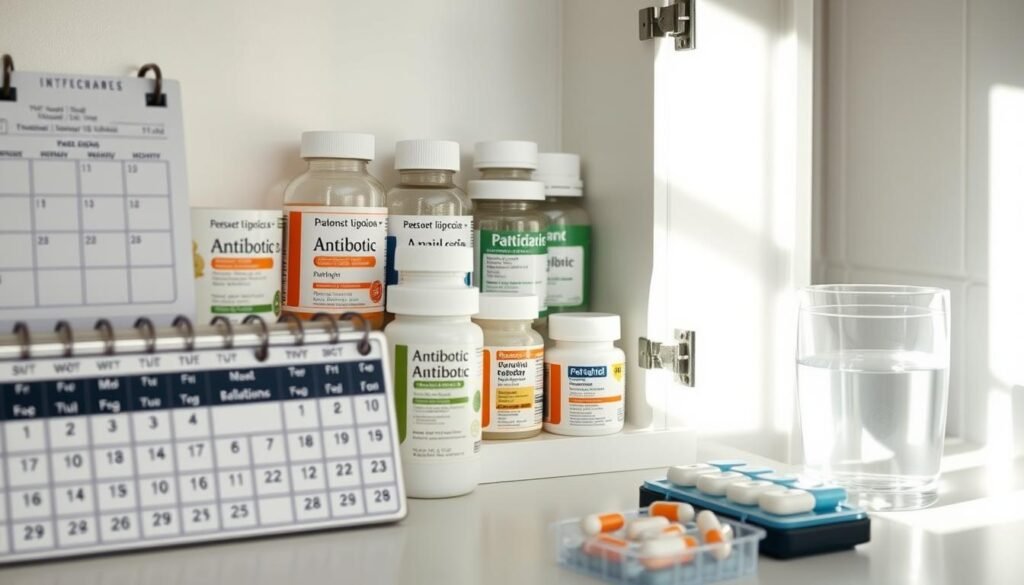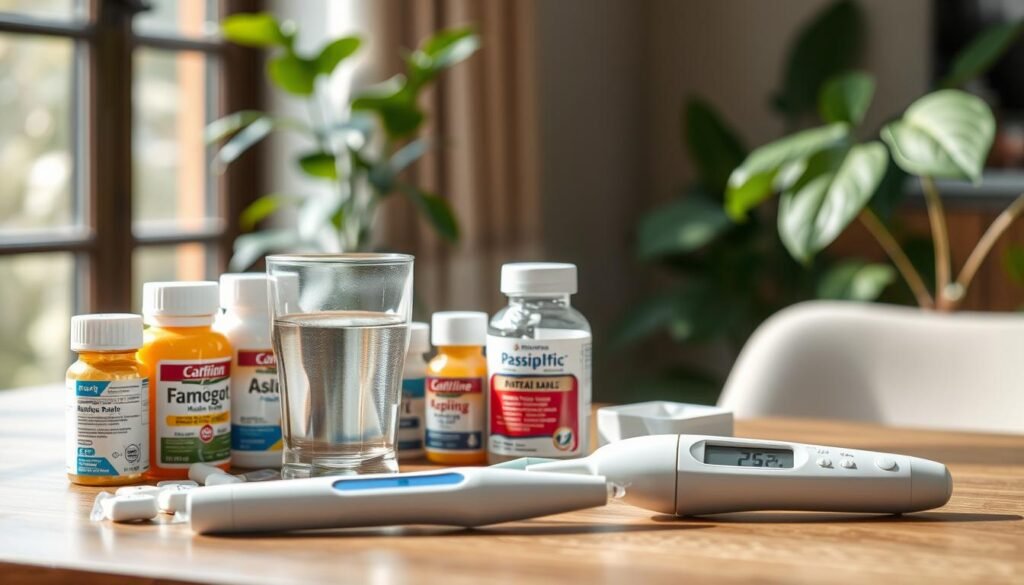Did you know about 5% of people taking vancomycin might feel tired as a side effect? Antibiotics are crucial for battling bacterial infections. But, they often bring side effects like tiredness. It’s key to grasp the impact of antibiotics-induced fatigue in today’s medicine-driven world.
This piece highlights the common antibiotic side effects, especially fatigue. It offers tips to deal with it too. Knowing these effects lets patients manage their treatment better. This ensures a smoother healing journey. For more insights on antibiotics and tiredness, check this out: explore antibiotics fatigue.
Key Takeaways
- Fatigue is a possible side effect of antibiotics, with vancomycin being a key example.
- Gastrointestinal upset, like diarrhea, tops the list of side effects.
- Allergic reactions to antibiotics vary from mild to serious.
- Good rest, staying hydrated, and eating well are crucial in easing fatigue.
- Probiotics can aid in maintaining a healthy gut during antibiotic therapy.
- It’s wise to skip alcohol when on antibiotics to avoid adverse effects.
Understanding Antibiotics and Their Purpose
Antibiotics are key in fighting off bacterial infections. They work by killing harmful bacteria or stopping their growth. Among them are penicillin types like amoxicillin, and doxycycline.
These medicines come as pills, creams, liquids, and shots. But they only work on bacterial infections, not viruses. So, conditions like colds or the flu won’t get better with antibiotics. Knowing when to use them is crucial.
Antibiotics don’t just target bad bacteria. They can also harm good bacteria, causing issues like severe diarrhea. They’re used to treat strep throat, sinus and skin infections, pneumonia, and UTIs. Side effects can range from mild to severe.
It’s important to know the risks of mixing antibiotics with alcohol. Alcohol can upset your stomach and delay healing. The time it takes for antibiotics to work can vary from a few days to two weeks.
The rise in antibiotic use has led to a serious problem: antibiotic resistance. Bacteria evolve and become resistant, creating “superbugs”. In the U.S., over 2.8 million infections each year are hard to treat because of this.
| Type of Antibiotic | Common Uses | Forms Available |
|---|---|---|
| Penicillin (e.g., Amoxicillin) | Strep throat, ear infections, pneumonia | Pills, injections |
| Doxycycline | Skin infections, UTIs, respiratory infections | Pills, ointments |
| Ciprofloxacin | UTIs, certain bacterial infections | Pills, injections |
What is Antibiotics Fatigue?
Antibiotics fatigue is when some people feel very tired while on antibiotic treatment. This tired feeling is usually because of your body fighting off an infection, and not directly because of the antibiotics. Although not everyone feels tired from antibiotics, certain ones like vancomycin are known to cause exhaustion.
Definition and Overview
“Antibiotics fatigue” means feeling tired from taking antibiotics. While most people do okay with antibiotics and don’t get tired, some antibiotics can make you feel weak. For example, less than 1% of people taking moxifloxacin or azithromycin report feeling tired. But with vancomycin, especially when given through an IV, about 5% of people say they feel fatigued.
Prevalence of Fatigue Among Antibiotic Users
Some people taking antibiotics, like vancomycin, might feel very tired, affecting their daily life. About 1 in 20 people on vancomycin report this tiredness. The severity of the infection, the effects of the drugs, and things like being dehydrated, eating poorly, and not sleeping enough can all make it worse. It’s really important to try to get seven to nine hours of sleep a night to help keep your energy up while you’re being treated.
| Antibiotic | Fatigue Rate | Notes |
|---|---|---|
| Moxifloxacin | Less than 1% | Rarely reported side effect |
| Azithromycin | Less than 1% | Macrolide antibiotic |
| Vancomycin | About 5% | More common in intravenous form |
| Itraconazole (Sporanox) | Up to 9% | Non-antibiotic antifungal |
Common Side Effects of Antibiotics
Antibiotics are key in fighting bacterial infections. But, they often bring side effects that affect our well-being. Knowing these effects allows for better health management.
Digestion-Related Issues
Upset stomach is a common side effect of antibiotics. Symptoms like diarrhea, nausea, and throwing up can disrupt your day. These issues can make the body feel tired as it tries to find balance again.
It’s crucial to drink plenty of fluids if you’re experiencing these symptoms. This is especially true for diarrhea, as not drinking enough can make you feel even more drained.
Skin Reactions and Allergic Responses
Skin problems can range from mild irritation to serious allergies. Itchy skin, rashes, and hives are common. In worse cases, it might get hard to breathe. Drugs like penicillin and cephalosporins often cause these reactions.
Noticing these symptoms early can help avoid worse issues. It may mean you have to stop the medication and get help from a doctor.
Impact on Energy Levels
Antibiotics don’t always make you tired directly. But, dealing with an infection, upset stomach, and poor sleep can make you feel worn out. Paying attention to good sleep habits and what you eat can help fight this tiredness.
Why Do Some People Experience Fatigue After Taking Antibiotics?
Fatigue after antibiotics comes from two key areas: the effects of the drugs and underlying health issues. Antibiotics fight infections, but they can also make some people feel very tired. This happens during or after treatment.
Direct Effects of Specific Antibiotics
Some antibiotics, like vancomycin, can make people feel tired. The Cleveland Clinic says about 1 in 20 on vancomycin feel fatigue. Drugs like Amoxicillin, Azithromycin, and Ciprofloxacin might also lead to tiredness. Although it’s rare, antibiotics can affect your energy. This could be due to your body adjusting its gut bacteria. Loss of good bacteria can wear you out. Other effects like nausea or diarrhea from antibiotics add to the fatigue.
Underlying Conditions and Their Role
It’s not always the antibiotics alone that make you tired. Health issues you already have might make it worse. If you suffer from chronic fatigue syndrome or an autoimmune disorder, you might feel extra tired with antibiotics. Doctors need to check for other fatigue causes to find the best treatment. If you’re getting more tired, see a doctor. It might mean your health needs another look.
| Antibiotic | Potential Fatigue Effects | Other Side Effects |
|---|---|---|
| Vancomycin | 1 in 20 may experience noticeable fatigue | Nausea, vomiting, skin rashes |
| Amoxicillin | Can cause tiredness | Diarrhea, upset stomach |
| Azithromycin | May lead to fatigue in some | Abdominal pain, headache |
| Ciprofloxacin | Tiredness reported | Nausea, dizziness, restlessness |
Factors Contributing to Antibiotic-Associated Weakness
The experience of feeling weak from antibiotics varies from person to person. Several factors contribute to this. Understanding these can help recognize the risk of fatigue with antibiotic use.
Your health condition greatly affects how you react to antibiotics. People with weak immune systems or existing health issues often feel more tired. Age also plays a big role, with older people more likely to feel weak due to slower metabolism.
The dose of antibiotics can impact how you feel. Higher doses might make side effects worse, including feelings of tiredness. Taking many different medicines can also make you feel more tired. It’s important to check all your medicines with your doctor.
Athletes use antibiotics to fight infections and reduce time away from sports. They might take these medicines more often than non-athletes. This can lead to concerns about feeling weak from antibiotics. Certain antibiotics can make muscles tired and painful, which affects how well athletes perform.
Clinical studies show certain antibiotics, like fluoroquinolones, can cause serious side effects. These include tendon injuries and can make weakness worse. Problems with mitochondria, crucial for muscle health, can also result from antibiotics. This highlights the complex issues surrounding antibiotic-related weakness.
Understanding what leads to weakness with antibiotics helps patients and doctors manage treatment better. This can make dealing with side effects easier.
Managing Antibiotics Fatigue Effectively
During antibiotic treatment, managing fatigue is key for smoother recovery. It’s crucial to rest well, sleep right, stay hydrated, and eat a balanced diet. These steps help fight off tiredness.
Rest and Sleep Guidelines
Getting enough rest helps the body heal from infection and fight fatigue. Experts say we need 7–8 hours of good sleep a night. To sleep better, make your bedtime routine relaxing and your sleeping space comfy.
Try rest strategies like reducing screen time before bed and mindfulness. These can make your sleep quality better.
Staying Hydrated
Staying hydrated is crucial when on antibiotics. Dehydration can make fatigue worse, and some antibiotics may upset your stomach. Drink plenty of fluids during the day to lessen these side effects.
Water, herbal teas, and broths are great for staying hydrated. They also help recovery.
Nutrition and Its Importance
A balanced diet is critical during antibiotic treatment. Eating fruits, veggies, lean proteins, whole grains, and healthy fats boosts energy. This helps improve your health overall.
Focus on nutrition during antibiotics to keep your gut healthy. Probiotics are key in bringing back good bacteria. This balances out antibiotics’ effects on your gut.

It’s vital to manage fatigue when using antibiotics. Following these guidelines helps with recovery and boosts well-being. If fatigue lasts, talking to a doctor is smart. They can offer more help to ensure your treatment works well.
For more details on fighting antibiotics fatigue, learn more here.
Using Probiotics During Antibiotic Treatment
Probiotics are crucial when you’re on antibiotics, helping keep your gut healthy. They balance the gut flora that antibiotics disturb, lowering side effects like diarrhea. Studies show that 5% to 35% of people may experience this, depending on the antibiotic. By adding probiotics, you can ease stomach problems and boost your overall wellness.
Benefits of Probiotics
Probiotics shine by battling dysbiosis, where harmful microbes outweigh beneficial ones. By using probiotics, people saw their risk of diarrhea or Clostridium difficile infections drop. A review of 23 studies found probiotics cut the risk of these issues by 64%. This highlights their role in good gut health.
How to Incorporate Probiotics
You can get probiotics through diet or pills. Look for them in yogurt, kefir, kombucha, and fermented veggies. If you pick supplements, choose proven strains like Lactobacillus acidophilus Rosell-52, Lactobacillus rhamnosus Rosell-11, and Bifidobacterium lactis Lafti B94. Check with a healthcare provider to find the right strains and doses. This will help your gut flora thrive, even during antibiotic use.
Guidelines for Proper Antibiotic Usage
It’s crucial to use antibiotics correctly to heal effectively. Patients need to follow strict rules to safeguard their health and dodge further problems. Knowing why it’s vital to finish all antibiotics is key.
Completing the Full Course
Finishing all your antibiotics stops the infection from coming back. It also prevents the bacteria from becoming resistant. You must stick to what your doctor says about how much and how long to take them. If you stop taking them too soon, you might not get better, and it could lead to more issues.
To learn more about side effects and how to deal with them, click here.
Avoiding Alcohol and Caffeine
When taking antibiotics, it’s smart to stay away from alcohol and cut down on caffeine. These can mess with your sleep and make you more tired during treatment. By avoiding alcohol and caffeine, you help your body recover faster. This way, you’ll feel better sooner and your treatment will work better.

Exploring Additional Solutions for Fatigue
Finding ways to fight fatigue during and after antibiotic treatment is key to well-being. Adding exercise and focusing on mental health is crucial. Together, they offer great tools for getting better.
The Role of Exercise
Doing light to moderate exercise can boost energy and mood. Activities like walking, stretching, or gentle yoga increase blood flow and health. They make you feel more awake and lively, helping you recover faster.
Before starting new exercises, checking with a doctor is important. They can help make a plan that fits your health needs.
Mental Health Considerations
Mental health impacts how tired you feel. Using strategies like mindfulness and reducing stress improves mental well-being. Counseling or therapy can also help. They reduce tiredness as you recover. Making mental health a priority is crucial in fighting fatigue from antibiotics.
When to Consult a Healthcare Provider
Many people may have antibiotic side effects. It’s key to tell normal reactions from worrying signs. If you feel very tired while on antibiotics, get healthcare guidance. This is key if tiredness gets worse, or you have trouble breathing, allergies, or ongoing stomach issues like diarrhea. Diarrhea is common with antibiotics.
Antibiotics might upset the body’s good bacteria, leading to issues like yeast infections. If you feel worse or have new symptoms after starting antibiotics, see a healthcare provider. They can check on you properly.
Knowing different antibiotic side effects is important. This helps you know when to get medical help. For example, fatigue from vancomycin happens in 1 in 20 people. But, antibiotics like penicillin can cause serious allergies. Seeing a doctor quickly can stop more problems.
To stay healthy with antibiotics, take care of your basic needs. Drink plenty of water, rest, and manage stress. Adding probiotics, as your doctor suggests, can help with side effects. Watch how you feel and talk to your doctor about any issues. This makes sure you get the right care while on treatment.

| Symptom | When to Seek Help |
|---|---|
| Severe Fatigue | Worsening fatigue that persists after antibiotic treatment |
| Allergic Reaction | Itching, swelling, or difficulty breathing |
| Digestive Issues | Persistent diarrhea or signs of infection like a yeast infection |
Using antibiotics right and knowing their risks is key. For help, patients can look up healthcare guidelines on infections and correct antibiotic use.
Remember, antibiotics treat bacteria, not viruses. If you’re unsure about your symptoms or treatment, talking to a healthcare provider is the best step.
Conclusion
Managing antibiotics fatigue is vital for patients fighting bacterial infections. Side effects like digestive issues, skin reactions, and feeling tired are common. Knowing about these can help patients take charge of their health and team up with doctors.
To reduce discomfort, effective treatment strategies are key. Staying hydrated, eating well, and adding probiotics to your diet can lessen fatigue. Plus, knowing when to get medical help makes the recovery path clearer.
In short, antibiotics are crucial for treating infections, but the fatigue they bring can be troubling. By being proactive in managing this fatigue, patients can ensure a smoother recovery and lessen side effects.